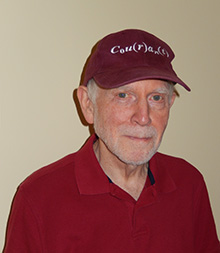2016-2017 Baylor Lecture Series in Mathematics
Percy Deift
Professor Percy Deift gave the tenth annual talks in the Baylor Lecture Series in Mathematics when he visited campus on September 12-15, 2016 Dr. Deift is Silver Professor at the Courant Institute of Mathematical Sciences at New York University.
Professor Deift was born in Durban, South Africa, where he obtained degrees in chemical engineering, physics and mathematics. He received his Ph.D. in mathematical physics from Princeton University in 1976 under the direction of Professor Barry Simon. He is a leading researcher in the analysis of Riemann Hilbert problems and their applications. His steepest descent method has enabled him to solve long-standing questions in diverse fields, such as algebraic geometry, analytic number theory, and random matrix theory.
Professor Deift has earned several honors and won several awards for his research. In 2009, he was elected to the US National Academy of Sciences. He is also a member of the American Academy of Arts and Sciences (elected 2013). Since 2012, he has been a Fellow of the American Mathematical Society.
He is a co-winner of the 1998 Pólya Prize and was named a Guggenheim Fellow in 1999. Professor Deift gave an invited lecture at the International Congress of Mathematicians in Berlin in 1998 and plenary addresses in 2006 at the International Congress of Mathematicians in Madrid and at the International Congress on Mathematical Physics in Rio de Janeiro. He also gave the Gibbs Lecture at the joint meeting of the American Mathematical Society in 2009.
The titles, and abstracts, for his two lectures are:
Tuesday, September 13, 2016 at 4:00 pm - Marrs McLean Science MMSCI 101
PUBLIC LECTURE: Integrable Systems
Abstract: The speaker will describe what is meant by an integrable system and how the concept developed. Many examples will be presented, from Newtonian mechanics to the Korteweg de Vries equation in the theory of water waves. Integrable probabilistic systems will also be discussed, such as the game of patience, which is a form of solitaire.
Wednesday, September 14, 2016 at 4:00 pm - MMSCI 301
Universality in numerical computations with random data. Case studies
Abstract: This is joint work with Govind Menon, Sheehan Olver and Thomas Trogdon. The speaker will present evidence for universality in numerical computations with random data. Given a (possibly stochastic) numerical algorithm with random input data, the time (or number of iterations) to convergence (within a given tolerance) is a random variable, called the halting time. Two-component universality is observed for the fluctuations of the halting time, i.e., the histogram for the halting times, centered by the sample average and scaled by the sample variance, collapses to a universal curve, independent of the input data distribution, as the dimension increases. Thus, up to two components, the sample average and the sample variance, the statistics for the halting time are universally prescribed. The case studies include six standard numerical algorithms, as well as a model of neural computation and decision making.
